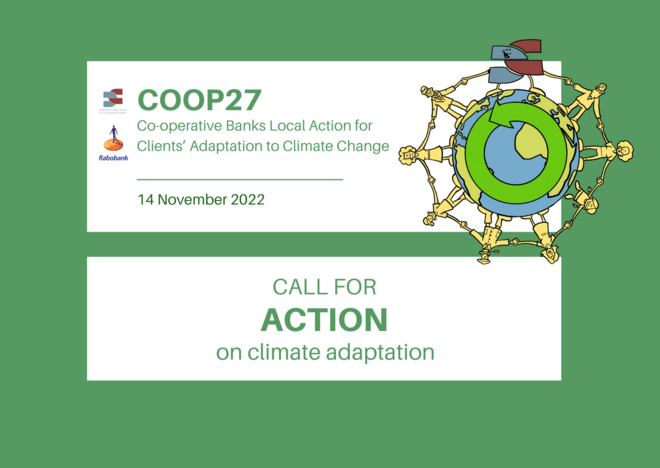Climate change is one of the greatest challenges facing us all. Every day, it is more evident how climate change is already impacting numerous areas and territories worldwide with tremendous consequences on people and societies. Awareness about climate risks has increased considerably, especially in the financial sector. Climate and environment related regulations and supervision are increasing strongly in number and scope. Financial institutions equally have a role to play by financing the transitions towards more sustainable economies. The members of the European Association of Co-operative Banks are committed to accompanying their clients and communities through the necessary transition to more sustainable and resilient business models. For this reason, in continuation with its event in 2021 which marked COP 26, the EACB organises the “CO-OP 27” event to showcase the climate adaptation actions of co-operative banks and their main clients, as well as to present views to policy makers on how to facilitate the role of co-operative banks in helping to increase resilience of the local economies.
DOWNLOAD THE FULL CALL FOR ACTION
None of us can do it alone, and we can leave no one behind.
We make a call on everyone involved to work together on these priorities:
5 POLICY ACTIONS
I. Engage with SMEs, households and communities to increase the awareness of the climate change challenges they are facing in order to help them to take investment decisions oriented towards enhancing resilience and ensure business continuity in case adverse natural events will occur.
II. Provide data and methodologies to underpin decision making, due to insufficient knowledge and awareness on climate change adaptation, risk, vulnerability and resilience.
III. Support planning, monitoring, reporting and evaluating of climate change adaptation, by establishing local and national adaptation strategies and create applicable guidance.
IV. Strengthen the cooperation and engagement of the banking sector and local governments to address in a better way the different needs of the territories when an extreme natural event occurs. Make public funds easily available for communities and local entities impacted by climate change.
V. Strengthen the utility sector and create risk maps to better understand the interdependencies between companies with the aim to increase the resilience of value chains and networks and avoid the “social desertification” of entire areas.



